Employability Skills Development: MBTI Reflection and Ethics Analysis
VerifiedAdded on 2021/06/18
|10
|2382
|24
Essay
AI Summary
This essay reflects on graduate employability skills, using the Myers-Briggs Type Indicator (MBTI) to assess personal strengths and weaknesses in relation to the recruitment process. The author, identified as an ISFJ, discusses the accuracy of the MBTI assessment and its implications for professional development. The essay also appraises the value of postgraduate study and international experience in enhancing employability, alongside an analysis of the importance of ethics in professional practice, citing a case study of unethical practices at Lush Cosmetics. The conclusion emphasizes the importance of continuous skills development and outlines an action plan for further improvement, highlighting the role of graduate studies and international experience in fostering professional growth. Desklib provides access to similar solved assignments and resources for students.
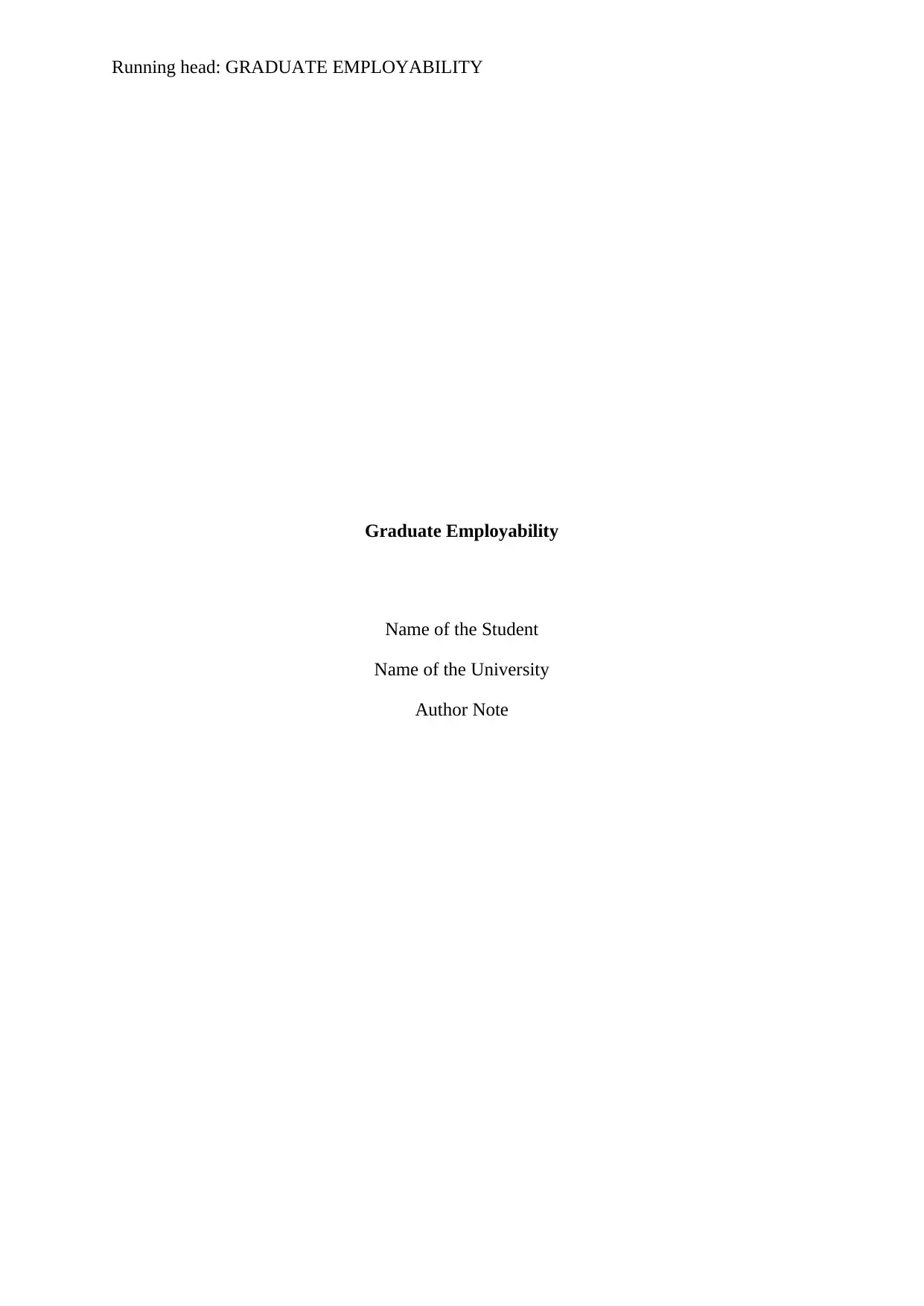
Running head: GRADUATE EMPLOYABILITY
Graduate Employability
Name of the Student
Name of the University
Author Note
Graduate Employability
Name of the Student
Name of the University
Author Note
Paraphrase This Document
Need a fresh take? Get an instant paraphrase of this document with our AI Paraphraser
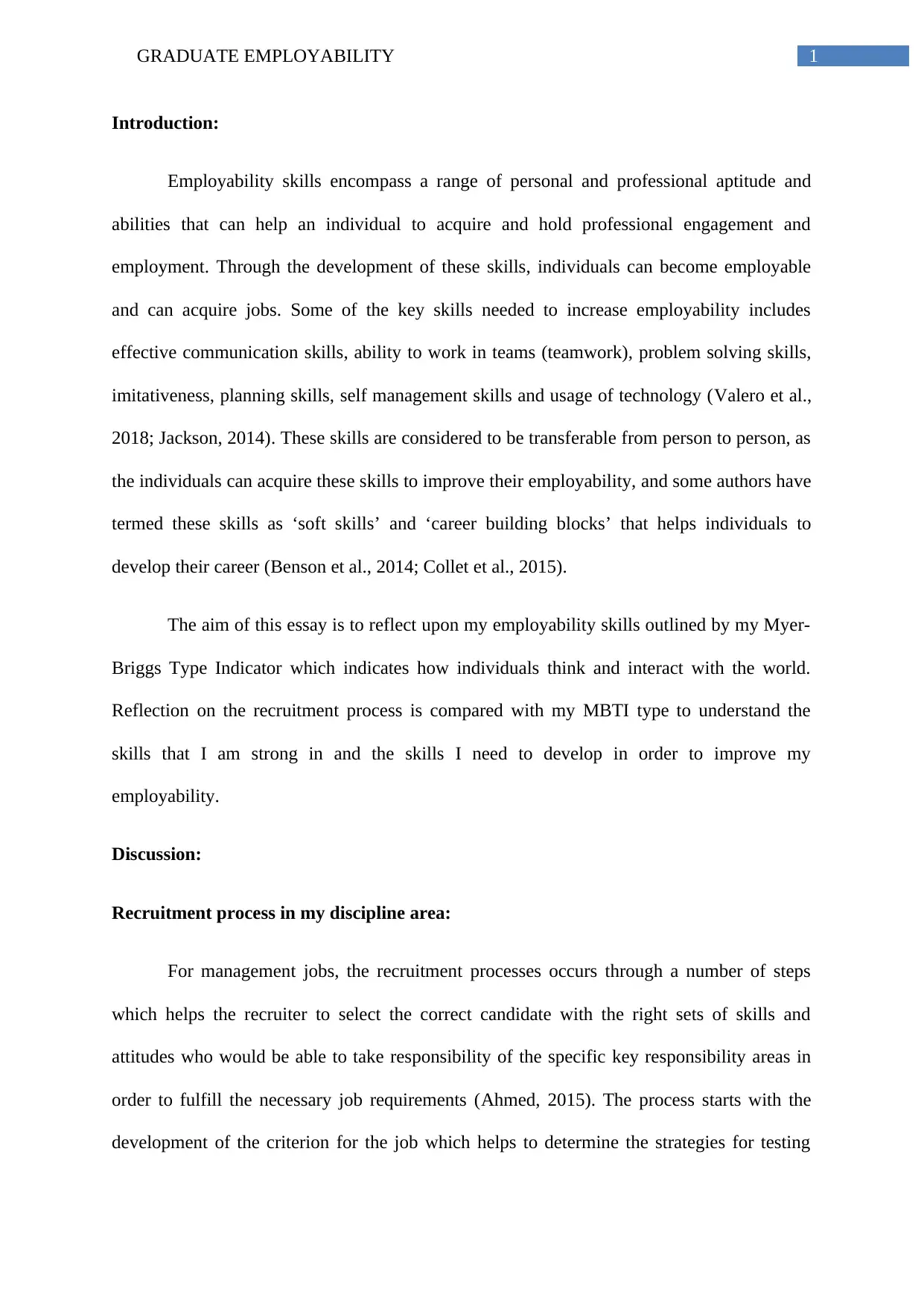
1GRADUATE EMPLOYABILITY
Introduction:
Employability skills encompass a range of personal and professional aptitude and
abilities that can help an individual to acquire and hold professional engagement and
employment. Through the development of these skills, individuals can become employable
and can acquire jobs. Some of the key skills needed to increase employability includes
effective communication skills, ability to work in teams (teamwork), problem solving skills,
imitativeness, planning skills, self management skills and usage of technology (Valero et al.,
2018; Jackson, 2014). These skills are considered to be transferable from person to person, as
the individuals can acquire these skills to improve their employability, and some authors have
termed these skills as ‘soft skills’ and ‘career building blocks’ that helps individuals to
develop their career (Benson et al., 2014; Collet et al., 2015).
The aim of this essay is to reflect upon my employability skills outlined by my Myer-
Briggs Type Indicator which indicates how individuals think and interact with the world.
Reflection on the recruitment process is compared with my MBTI type to understand the
skills that I am strong in and the skills I need to develop in order to improve my
employability.
Discussion:
Recruitment process in my discipline area:
For management jobs, the recruitment processes occurs through a number of steps
which helps the recruiter to select the correct candidate with the right sets of skills and
attitudes who would be able to take responsibility of the specific key responsibility areas in
order to fulfill the necessary job requirements (Ahmed, 2015). The process starts with the
development of the criterion for the job which helps to determine the strategies for testing
Introduction:
Employability skills encompass a range of personal and professional aptitude and
abilities that can help an individual to acquire and hold professional engagement and
employment. Through the development of these skills, individuals can become employable
and can acquire jobs. Some of the key skills needed to increase employability includes
effective communication skills, ability to work in teams (teamwork), problem solving skills,
imitativeness, planning skills, self management skills and usage of technology (Valero et al.,
2018; Jackson, 2014). These skills are considered to be transferable from person to person, as
the individuals can acquire these skills to improve their employability, and some authors have
termed these skills as ‘soft skills’ and ‘career building blocks’ that helps individuals to
develop their career (Benson et al., 2014; Collet et al., 2015).
The aim of this essay is to reflect upon my employability skills outlined by my Myer-
Briggs Type Indicator which indicates how individuals think and interact with the world.
Reflection on the recruitment process is compared with my MBTI type to understand the
skills that I am strong in and the skills I need to develop in order to improve my
employability.
Discussion:
Recruitment process in my discipline area:
For management jobs, the recruitment processes occurs through a number of steps
which helps the recruiter to select the correct candidate with the right sets of skills and
attitudes who would be able to take responsibility of the specific key responsibility areas in
order to fulfill the necessary job requirements (Ahmed, 2015). The process starts with the
development of the criterion for the job which helps to determine the strategies for testing
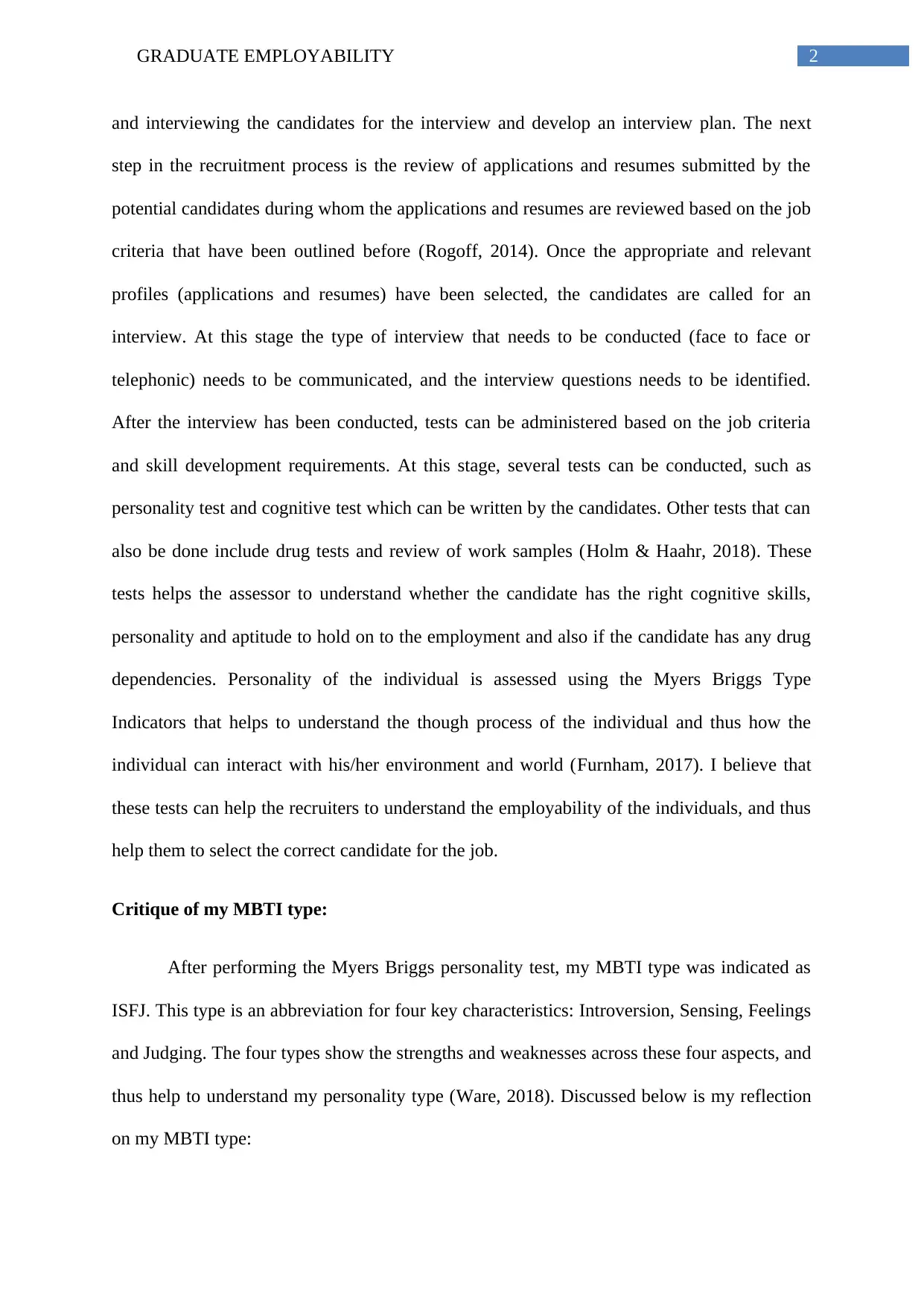
2GRADUATE EMPLOYABILITY
and interviewing the candidates for the interview and develop an interview plan. The next
step in the recruitment process is the review of applications and resumes submitted by the
potential candidates during whom the applications and resumes are reviewed based on the job
criteria that have been outlined before (Rogoff, 2014). Once the appropriate and relevant
profiles (applications and resumes) have been selected, the candidates are called for an
interview. At this stage the type of interview that needs to be conducted (face to face or
telephonic) needs to be communicated, and the interview questions needs to be identified.
After the interview has been conducted, tests can be administered based on the job criteria
and skill development requirements. At this stage, several tests can be conducted, such as
personality test and cognitive test which can be written by the candidates. Other tests that can
also be done include drug tests and review of work samples (Holm & Haahr, 2018). These
tests helps the assessor to understand whether the candidate has the right cognitive skills,
personality and aptitude to hold on to the employment and also if the candidate has any drug
dependencies. Personality of the individual is assessed using the Myers Briggs Type
Indicators that helps to understand the though process of the individual and thus how the
individual can interact with his/her environment and world (Furnham, 2017). I believe that
these tests can help the recruiters to understand the employability of the individuals, and thus
help them to select the correct candidate for the job.
Critique of my MBTI type:
After performing the Myers Briggs personality test, my MBTI type was indicated as
ISFJ. This type is an abbreviation for four key characteristics: Introversion, Sensing, Feelings
and Judging. The four types show the strengths and weaknesses across these four aspects, and
thus help to understand my personality type (Ware, 2018). Discussed below is my reflection
on my MBTI type:
and interviewing the candidates for the interview and develop an interview plan. The next
step in the recruitment process is the review of applications and resumes submitted by the
potential candidates during whom the applications and resumes are reviewed based on the job
criteria that have been outlined before (Rogoff, 2014). Once the appropriate and relevant
profiles (applications and resumes) have been selected, the candidates are called for an
interview. At this stage the type of interview that needs to be conducted (face to face or
telephonic) needs to be communicated, and the interview questions needs to be identified.
After the interview has been conducted, tests can be administered based on the job criteria
and skill development requirements. At this stage, several tests can be conducted, such as
personality test and cognitive test which can be written by the candidates. Other tests that can
also be done include drug tests and review of work samples (Holm & Haahr, 2018). These
tests helps the assessor to understand whether the candidate has the right cognitive skills,
personality and aptitude to hold on to the employment and also if the candidate has any drug
dependencies. Personality of the individual is assessed using the Myers Briggs Type
Indicators that helps to understand the though process of the individual and thus how the
individual can interact with his/her environment and world (Furnham, 2017). I believe that
these tests can help the recruiters to understand the employability of the individuals, and thus
help them to select the correct candidate for the job.
Critique of my MBTI type:
After performing the Myers Briggs personality test, my MBTI type was indicated as
ISFJ. This type is an abbreviation for four key characteristics: Introversion, Sensing, Feelings
and Judging. The four types show the strengths and weaknesses across these four aspects, and
thus help to understand my personality type (Ware, 2018). Discussed below is my reflection
on my MBTI type:
⊘ This is a preview!⊘
Do you want full access?
Subscribe today to unlock all pages.

Trusted by 1+ million students worldwide
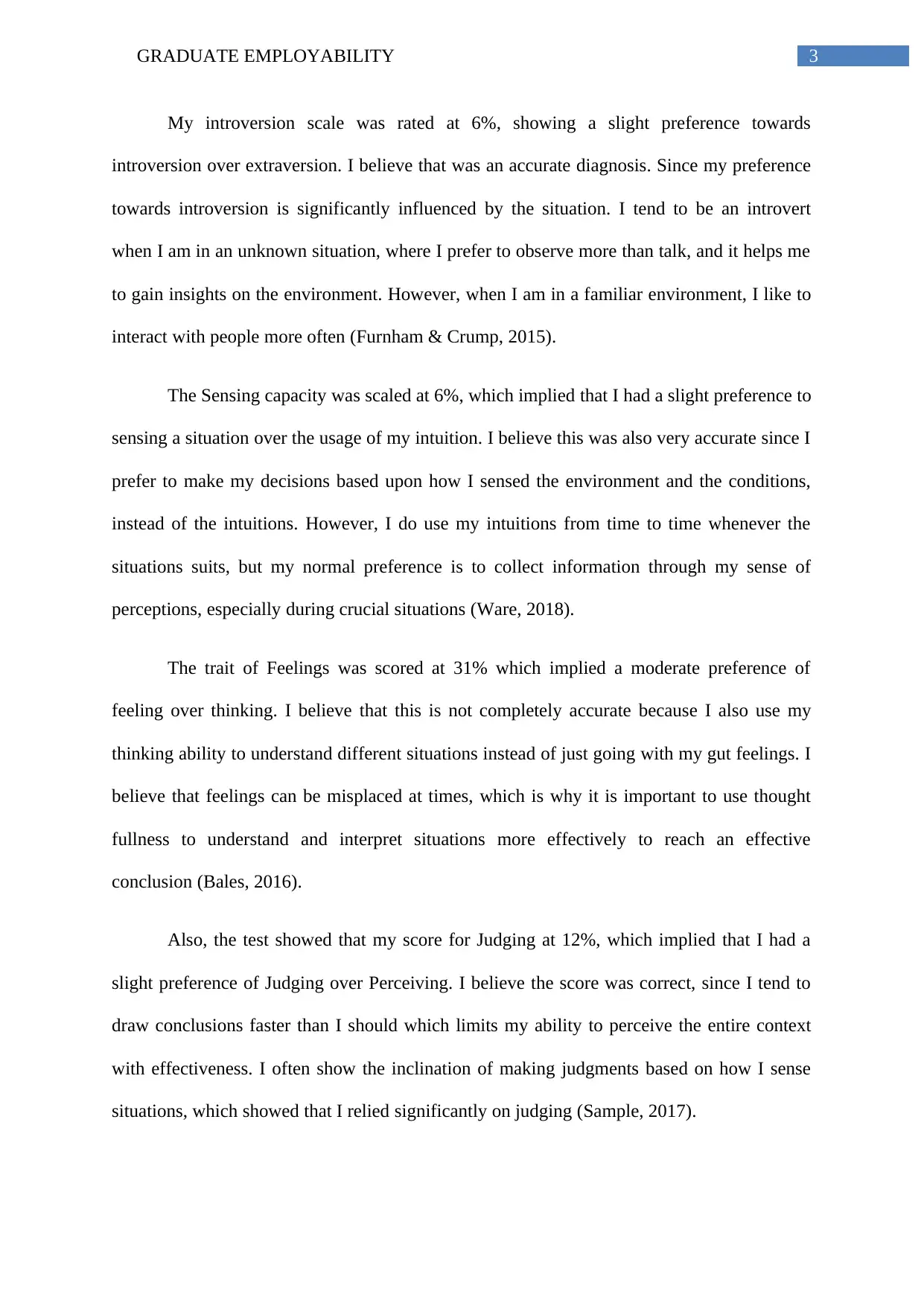
3GRADUATE EMPLOYABILITY
My introversion scale was rated at 6%, showing a slight preference towards
introversion over extraversion. I believe that was an accurate diagnosis. Since my preference
towards introversion is significantly influenced by the situation. I tend to be an introvert
when I am in an unknown situation, where I prefer to observe more than talk, and it helps me
to gain insights on the environment. However, when I am in a familiar environment, I like to
interact with people more often (Furnham & Crump, 2015).
The Sensing capacity was scaled at 6%, which implied that I had a slight preference to
sensing a situation over the usage of my intuition. I believe this was also very accurate since I
prefer to make my decisions based upon how I sensed the environment and the conditions,
instead of the intuitions. However, I do use my intuitions from time to time whenever the
situations suits, but my normal preference is to collect information through my sense of
perceptions, especially during crucial situations (Ware, 2018).
The trait of Feelings was scored at 31% which implied a moderate preference of
feeling over thinking. I believe that this is not completely accurate because I also use my
thinking ability to understand different situations instead of just going with my gut feelings. I
believe that feelings can be misplaced at times, which is why it is important to use thought
fullness to understand and interpret situations more effectively to reach an effective
conclusion (Bales, 2016).
Also, the test showed that my score for Judging at 12%, which implied that I had a
slight preference of Judging over Perceiving. I believe the score was correct, since I tend to
draw conclusions faster than I should which limits my ability to perceive the entire context
with effectiveness. I often show the inclination of making judgments based on how I sense
situations, which showed that I relied significantly on judging (Sample, 2017).
My introversion scale was rated at 6%, showing a slight preference towards
introversion over extraversion. I believe that was an accurate diagnosis. Since my preference
towards introversion is significantly influenced by the situation. I tend to be an introvert
when I am in an unknown situation, where I prefer to observe more than talk, and it helps me
to gain insights on the environment. However, when I am in a familiar environment, I like to
interact with people more often (Furnham & Crump, 2015).
The Sensing capacity was scaled at 6%, which implied that I had a slight preference to
sensing a situation over the usage of my intuition. I believe this was also very accurate since I
prefer to make my decisions based upon how I sensed the environment and the conditions,
instead of the intuitions. However, I do use my intuitions from time to time whenever the
situations suits, but my normal preference is to collect information through my sense of
perceptions, especially during crucial situations (Ware, 2018).
The trait of Feelings was scored at 31% which implied a moderate preference of
feeling over thinking. I believe that this is not completely accurate because I also use my
thinking ability to understand different situations instead of just going with my gut feelings. I
believe that feelings can be misplaced at times, which is why it is important to use thought
fullness to understand and interpret situations more effectively to reach an effective
conclusion (Bales, 2016).
Also, the test showed that my score for Judging at 12%, which implied that I had a
slight preference of Judging over Perceiving. I believe the score was correct, since I tend to
draw conclusions faster than I should which limits my ability to perceive the entire context
with effectiveness. I often show the inclination of making judgments based on how I sense
situations, which showed that I relied significantly on judging (Sample, 2017).
Paraphrase This Document
Need a fresh take? Get an instant paraphrase of this document with our AI Paraphraser
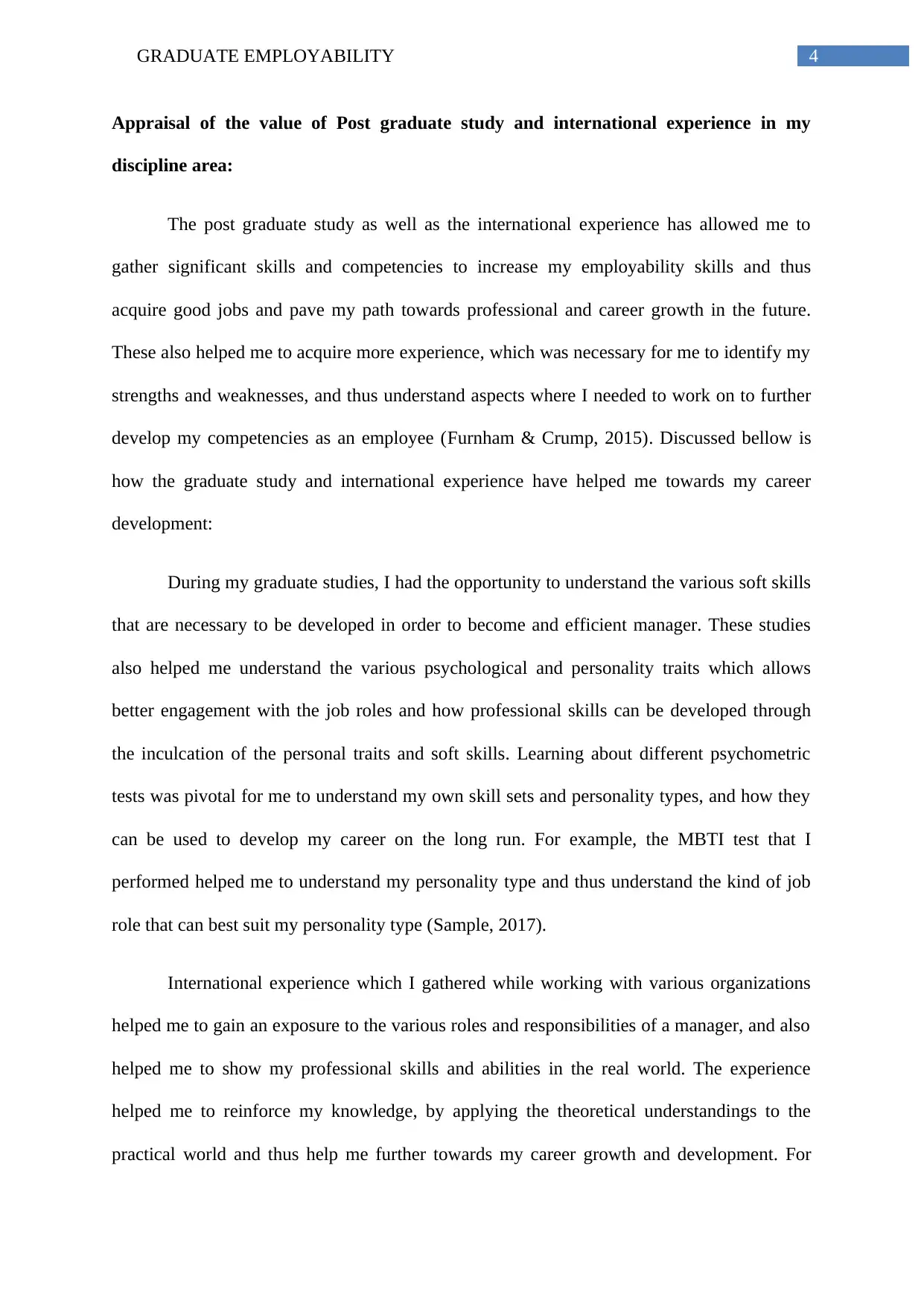
4GRADUATE EMPLOYABILITY
Appraisal of the value of Post graduate study and international experience in my
discipline area:
The post graduate study as well as the international experience has allowed me to
gather significant skills and competencies to increase my employability skills and thus
acquire good jobs and pave my path towards professional and career growth in the future.
These also helped me to acquire more experience, which was necessary for me to identify my
strengths and weaknesses, and thus understand aspects where I needed to work on to further
develop my competencies as an employee (Furnham & Crump, 2015). Discussed bellow is
how the graduate study and international experience have helped me towards my career
development:
During my graduate studies, I had the opportunity to understand the various soft skills
that are necessary to be developed in order to become and efficient manager. These studies
also helped me understand the various psychological and personality traits which allows
better engagement with the job roles and how professional skills can be developed through
the inculcation of the personal traits and soft skills. Learning about different psychometric
tests was pivotal for me to understand my own skill sets and personality types, and how they
can be used to develop my career on the long run. For example, the MBTI test that I
performed helped me to understand my personality type and thus understand the kind of job
role that can best suit my personality type (Sample, 2017).
International experience which I gathered while working with various organizations
helped me to gain an exposure to the various roles and responsibilities of a manager, and also
helped me to show my professional skills and abilities in the real world. The experience
helped me to reinforce my knowledge, by applying the theoretical understandings to the
practical world and thus help me further towards my career growth and development. For
Appraisal of the value of Post graduate study and international experience in my
discipline area:
The post graduate study as well as the international experience has allowed me to
gather significant skills and competencies to increase my employability skills and thus
acquire good jobs and pave my path towards professional and career growth in the future.
These also helped me to acquire more experience, which was necessary for me to identify my
strengths and weaknesses, and thus understand aspects where I needed to work on to further
develop my competencies as an employee (Furnham & Crump, 2015). Discussed bellow is
how the graduate study and international experience have helped me towards my career
development:
During my graduate studies, I had the opportunity to understand the various soft skills
that are necessary to be developed in order to become and efficient manager. These studies
also helped me understand the various psychological and personality traits which allows
better engagement with the job roles and how professional skills can be developed through
the inculcation of the personal traits and soft skills. Learning about different psychometric
tests was pivotal for me to understand my own skill sets and personality types, and how they
can be used to develop my career on the long run. For example, the MBTI test that I
performed helped me to understand my personality type and thus understand the kind of job
role that can best suit my personality type (Sample, 2017).
International experience which I gathered while working with various organizations
helped me to gain an exposure to the various roles and responsibilities of a manager, and also
helped me to show my professional skills and abilities in the real world. The experience
helped me to reinforce my knowledge, by applying the theoretical understandings to the
practical world and thus help me further towards my career growth and development. For
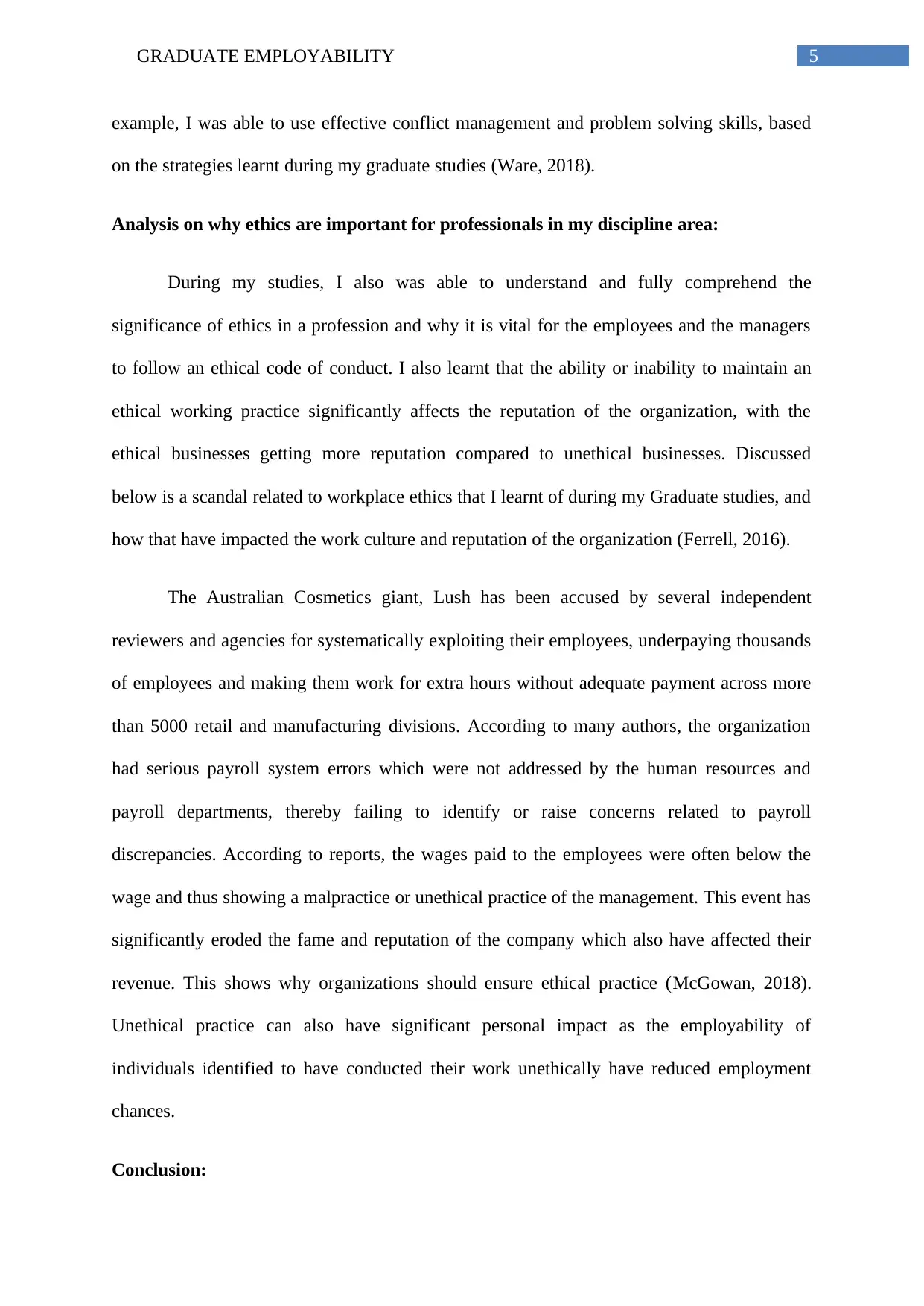
5GRADUATE EMPLOYABILITY
example, I was able to use effective conflict management and problem solving skills, based
on the strategies learnt during my graduate studies (Ware, 2018).
Analysis on why ethics are important for professionals in my discipline area:
During my studies, I also was able to understand and fully comprehend the
significance of ethics in a profession and why it is vital for the employees and the managers
to follow an ethical code of conduct. I also learnt that the ability or inability to maintain an
ethical working practice significantly affects the reputation of the organization, with the
ethical businesses getting more reputation compared to unethical businesses. Discussed
below is a scandal related to workplace ethics that I learnt of during my Graduate studies, and
how that have impacted the work culture and reputation of the organization (Ferrell, 2016).
The Australian Cosmetics giant, Lush has been accused by several independent
reviewers and agencies for systematically exploiting their employees, underpaying thousands
of employees and making them work for extra hours without adequate payment across more
than 5000 retail and manufacturing divisions. According to many authors, the organization
had serious payroll system errors which were not addressed by the human resources and
payroll departments, thereby failing to identify or raise concerns related to payroll
discrepancies. According to reports, the wages paid to the employees were often below the
wage and thus showing a malpractice or unethical practice of the management. This event has
significantly eroded the fame and reputation of the company which also have affected their
revenue. This shows why organizations should ensure ethical practice (McGowan, 2018).
Unethical practice can also have significant personal impact as the employability of
individuals identified to have conducted their work unethically have reduced employment
chances.
Conclusion:
example, I was able to use effective conflict management and problem solving skills, based
on the strategies learnt during my graduate studies (Ware, 2018).
Analysis on why ethics are important for professionals in my discipline area:
During my studies, I also was able to understand and fully comprehend the
significance of ethics in a profession and why it is vital for the employees and the managers
to follow an ethical code of conduct. I also learnt that the ability or inability to maintain an
ethical working practice significantly affects the reputation of the organization, with the
ethical businesses getting more reputation compared to unethical businesses. Discussed
below is a scandal related to workplace ethics that I learnt of during my Graduate studies, and
how that have impacted the work culture and reputation of the organization (Ferrell, 2016).
The Australian Cosmetics giant, Lush has been accused by several independent
reviewers and agencies for systematically exploiting their employees, underpaying thousands
of employees and making them work for extra hours without adequate payment across more
than 5000 retail and manufacturing divisions. According to many authors, the organization
had serious payroll system errors which were not addressed by the human resources and
payroll departments, thereby failing to identify or raise concerns related to payroll
discrepancies. According to reports, the wages paid to the employees were often below the
wage and thus showing a malpractice or unethical practice of the management. This event has
significantly eroded the fame and reputation of the company which also have affected their
revenue. This shows why organizations should ensure ethical practice (McGowan, 2018).
Unethical practice can also have significant personal impact as the employability of
individuals identified to have conducted their work unethically have reduced employment
chances.
Conclusion:
⊘ This is a preview!⊘
Do you want full access?
Subscribe today to unlock all pages.

Trusted by 1+ million students worldwide
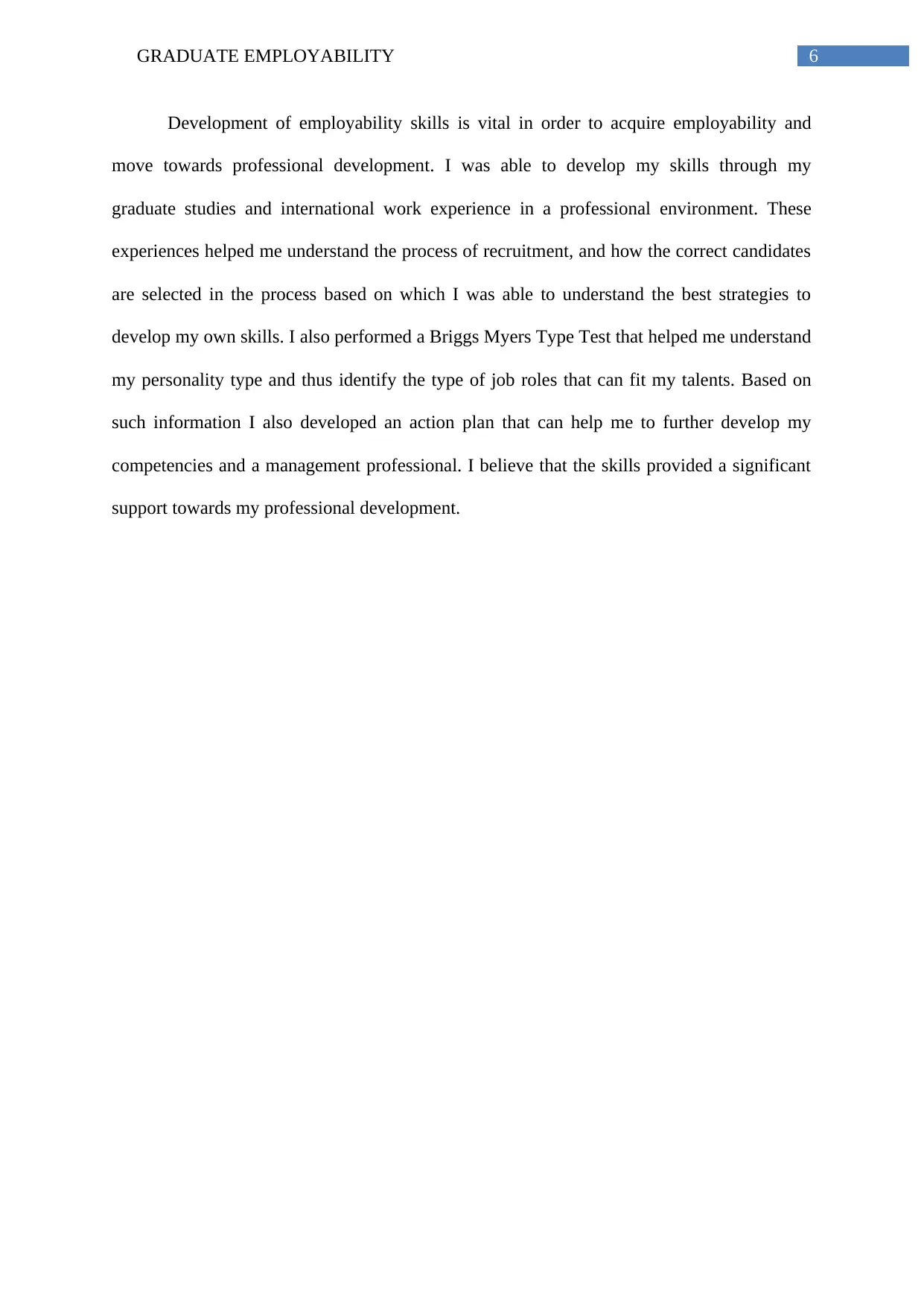
6GRADUATE EMPLOYABILITY
Development of employability skills is vital in order to acquire employability and
move towards professional development. I was able to develop my skills through my
graduate studies and international work experience in a professional environment. These
experiences helped me understand the process of recruitment, and how the correct candidates
are selected in the process based on which I was able to understand the best strategies to
develop my own skills. I also performed a Briggs Myers Type Test that helped me understand
my personality type and thus identify the type of job roles that can fit my talents. Based on
such information I also developed an action plan that can help me to further develop my
competencies and a management professional. I believe that the skills provided a significant
support towards my professional development.
Development of employability skills is vital in order to acquire employability and
move towards professional development. I was able to develop my skills through my
graduate studies and international work experience in a professional environment. These
experiences helped me understand the process of recruitment, and how the correct candidates
are selected in the process based on which I was able to understand the best strategies to
develop my own skills. I also performed a Briggs Myers Type Test that helped me understand
my personality type and thus identify the type of job roles that can fit my talents. Based on
such information I also developed an action plan that can help me to further develop my
competencies and a management professional. I believe that the skills provided a significant
support towards my professional development.
Paraphrase This Document
Need a fresh take? Get an instant paraphrase of this document with our AI Paraphraser
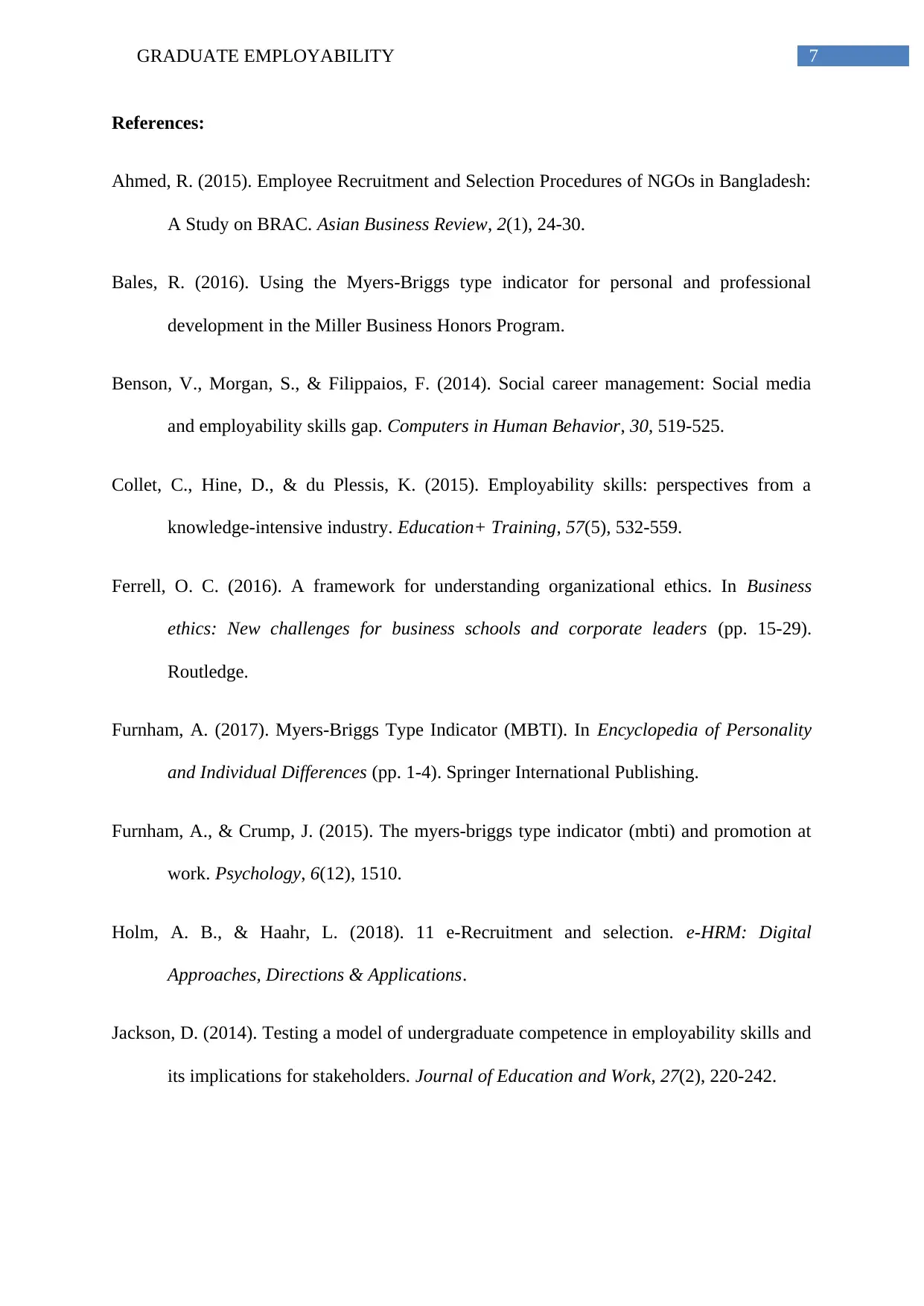
7GRADUATE EMPLOYABILITY
References:
Ahmed, R. (2015). Employee Recruitment and Selection Procedures of NGOs in Bangladesh:
A Study on BRAC. Asian Business Review, 2(1), 24-30.
Bales, R. (2016). Using the Myers-Briggs type indicator for personal and professional
development in the Miller Business Honors Program.
Benson, V., Morgan, S., & Filippaios, F. (2014). Social career management: Social media
and employability skills gap. Computers in Human Behavior, 30, 519-525.
Collet, C., Hine, D., & du Plessis, K. (2015). Employability skills: perspectives from a
knowledge-intensive industry. Education+ Training, 57(5), 532-559.
Ferrell, O. C. (2016). A framework for understanding organizational ethics. In Business
ethics: New challenges for business schools and corporate leaders (pp. 15-29).
Routledge.
Furnham, A. (2017). Myers-Briggs Type Indicator (MBTI). In Encyclopedia of Personality
and Individual Differences (pp. 1-4). Springer International Publishing.
Furnham, A., & Crump, J. (2015). The myers-briggs type indicator (mbti) and promotion at
work. Psychology, 6(12), 1510.
Holm, A. B., & Haahr, L. (2018). 11 e-Recruitment and selection. e-HRM: Digital
Approaches, Directions & Applications.
Jackson, D. (2014). Testing a model of undergraduate competence in employability skills and
its implications for stakeholders. Journal of Education and Work, 27(2), 220-242.
References:
Ahmed, R. (2015). Employee Recruitment and Selection Procedures of NGOs in Bangladesh:
A Study on BRAC. Asian Business Review, 2(1), 24-30.
Bales, R. (2016). Using the Myers-Briggs type indicator for personal and professional
development in the Miller Business Honors Program.
Benson, V., Morgan, S., & Filippaios, F. (2014). Social career management: Social media
and employability skills gap. Computers in Human Behavior, 30, 519-525.
Collet, C., Hine, D., & du Plessis, K. (2015). Employability skills: perspectives from a
knowledge-intensive industry. Education+ Training, 57(5), 532-559.
Ferrell, O. C. (2016). A framework for understanding organizational ethics. In Business
ethics: New challenges for business schools and corporate leaders (pp. 15-29).
Routledge.
Furnham, A. (2017). Myers-Briggs Type Indicator (MBTI). In Encyclopedia of Personality
and Individual Differences (pp. 1-4). Springer International Publishing.
Furnham, A., & Crump, J. (2015). The myers-briggs type indicator (mbti) and promotion at
work. Psychology, 6(12), 1510.
Holm, A. B., & Haahr, L. (2018). 11 e-Recruitment and selection. e-HRM: Digital
Approaches, Directions & Applications.
Jackson, D. (2014). Testing a model of undergraduate competence in employability skills and
its implications for stakeholders. Journal of Education and Work, 27(2), 220-242.
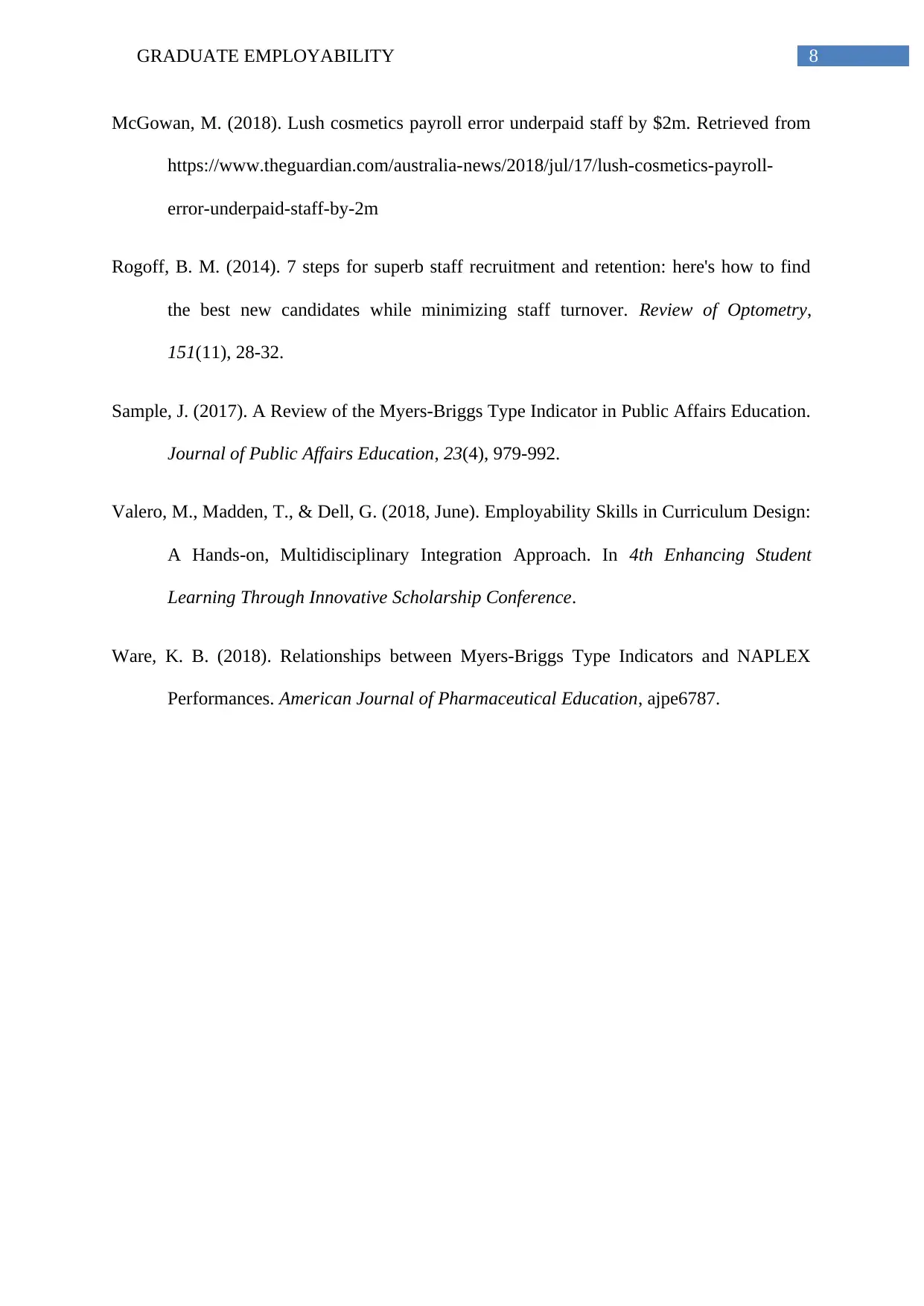
8GRADUATE EMPLOYABILITY
McGowan, M. (2018). Lush cosmetics payroll error underpaid staff by $2m. Retrieved from
https://www.theguardian.com/australia-news/2018/jul/17/lush-cosmetics-payroll-
error-underpaid-staff-by-2m
Rogoff, B. M. (2014). 7 steps for superb staff recruitment and retention: here's how to find
the best new candidates while minimizing staff turnover. Review of Optometry,
151(11), 28-32.
Sample, J. (2017). A Review of the Myers-Briggs Type Indicator in Public Affairs Education.
Journal of Public Affairs Education, 23(4), 979-992.
Valero, M., Madden, T., & Dell, G. (2018, June). Employability Skills in Curriculum Design:
A Hands-on, Multidisciplinary Integration Approach. In 4th Enhancing Student
Learning Through Innovative Scholarship Conference.
Ware, K. B. (2018). Relationships between Myers-Briggs Type Indicators and NAPLEX
Performances. American Journal of Pharmaceutical Education, ajpe6787.
McGowan, M. (2018). Lush cosmetics payroll error underpaid staff by $2m. Retrieved from
https://www.theguardian.com/australia-news/2018/jul/17/lush-cosmetics-payroll-
error-underpaid-staff-by-2m
Rogoff, B. M. (2014). 7 steps for superb staff recruitment and retention: here's how to find
the best new candidates while minimizing staff turnover. Review of Optometry,
151(11), 28-32.
Sample, J. (2017). A Review of the Myers-Briggs Type Indicator in Public Affairs Education.
Journal of Public Affairs Education, 23(4), 979-992.
Valero, M., Madden, T., & Dell, G. (2018, June). Employability Skills in Curriculum Design:
A Hands-on, Multidisciplinary Integration Approach. In 4th Enhancing Student
Learning Through Innovative Scholarship Conference.
Ware, K. B. (2018). Relationships between Myers-Briggs Type Indicators and NAPLEX
Performances. American Journal of Pharmaceutical Education, ajpe6787.
⊘ This is a preview!⊘
Do you want full access?
Subscribe today to unlock all pages.

Trusted by 1+ million students worldwide
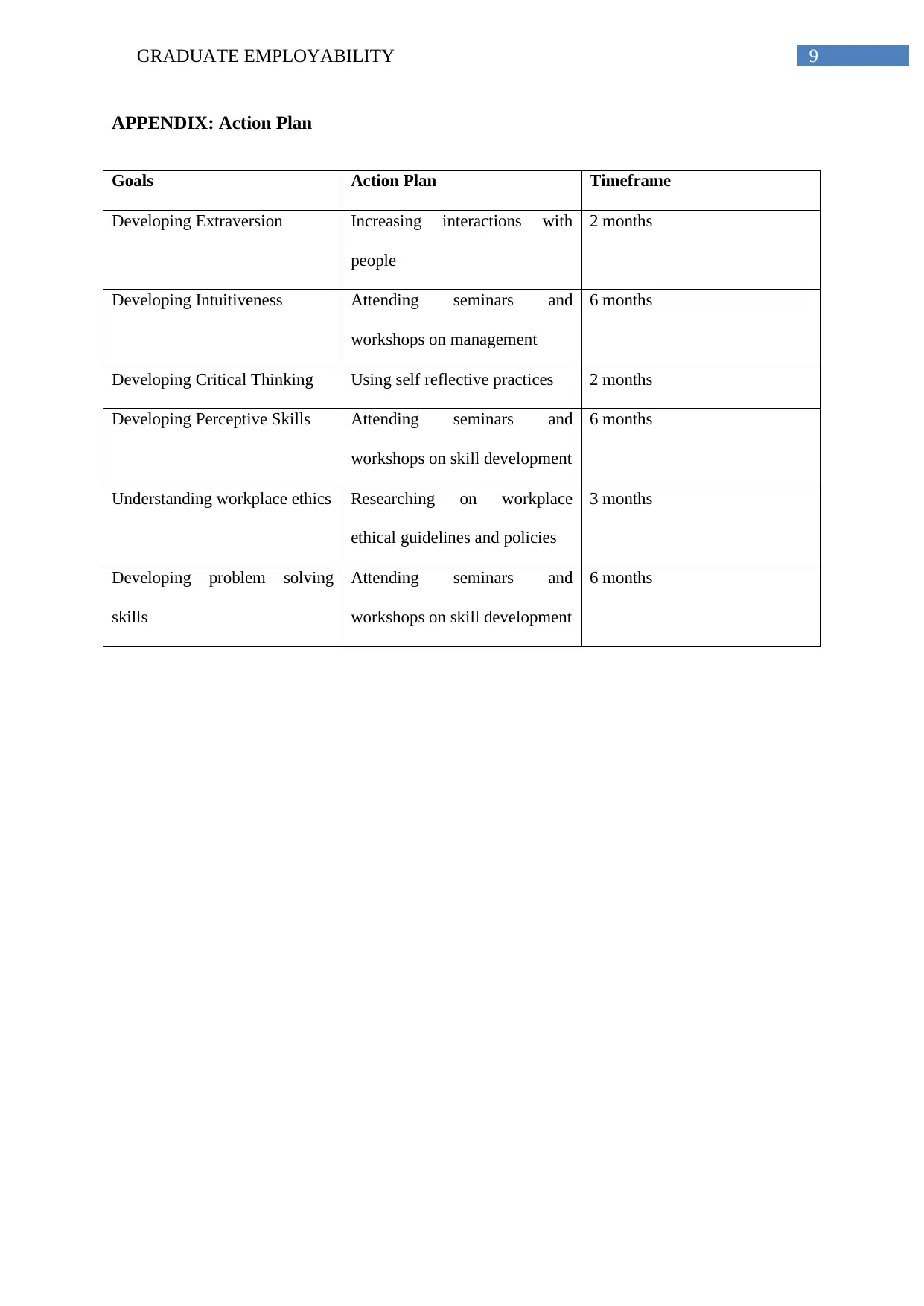
9GRADUATE EMPLOYABILITY
APPENDIX: Action Plan
Goals Action Plan Timeframe
Developing Extraversion Increasing interactions with
people
2 months
Developing Intuitiveness Attending seminars and
workshops on management
6 months
Developing Critical Thinking Using self reflective practices 2 months
Developing Perceptive Skills Attending seminars and
workshops on skill development
6 months
Understanding workplace ethics Researching on workplace
ethical guidelines and policies
3 months
Developing problem solving
skills
Attending seminars and
workshops on skill development
6 months
APPENDIX: Action Plan
Goals Action Plan Timeframe
Developing Extraversion Increasing interactions with
people
2 months
Developing Intuitiveness Attending seminars and
workshops on management
6 months
Developing Critical Thinking Using self reflective practices 2 months
Developing Perceptive Skills Attending seminars and
workshops on skill development
6 months
Understanding workplace ethics Researching on workplace
ethical guidelines and policies
3 months
Developing problem solving
skills
Attending seminars and
workshops on skill development
6 months
1 out of 10
Related Documents
Your All-in-One AI-Powered Toolkit for Academic Success.
+13062052269
info@desklib.com
Available 24*7 on WhatsApp / Email
![[object Object]](/_next/static/media/star-bottom.7253800d.svg)
Unlock your academic potential
Copyright © 2020–2026 A2Z Services. All Rights Reserved. Developed and managed by ZUCOL.





